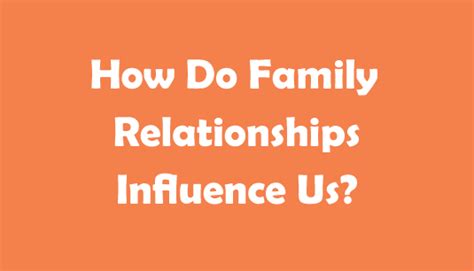The intricate tapestry of human relationships begins to weave itself in the earliest stages of life, specifically within the family unit. For men, these foundational experiences are not merely fleeting memories but powerful blueprints that can profoundly influence their approach to long-term platonic friendships in adulthood. From the nuances of attachment to the unspoken rules of emotional expression, early family dynamics lay the groundwork for how men connect, trust, and sustain bonds outside of romantic partnerships.
The Foundation of Attachment Styles
One of the most significant influences stems from early attachment styles formed with primary caregivers. A secure attachment, characterized by consistent responsiveness and emotional availability, often fosters a man’s ability to form secure, trusting, and open friendships. He learns that others can be relied upon, that his needs are valid, and that emotional intimacy is safe.

Conversely, insecure attachment styles – avoidant or anxious-ambivalent – can create different patterns. A man with an avoidant attachment style, often developed due to unresponsive or dismissing caregivers, might struggle with emotional vulnerability, seeking independence to an extreme, and maintaining superficial friendships. He may unconsciously fear closeness or perceive emotional needs as a burden. An anxious-ambivalent style, stemming from inconsistent care, might lead to a man who craves closeness but is simultaneously wary of abandonment, potentially leading to clinginess or testing behaviors in friendships.
Communication Patterns and Emotional Expression
The way emotions were discussed (or not discussed) in a man’s early family profoundly impacts his capacity for emotional intimacy and self-disclosure in friendships. Families that encouraged open dialogue about feelings, provided space for vulnerability, and validated emotional experiences tend to raise men who are more comfortable expressing themselves authentically. They are better equipped to share personal struggles, offer empathetic support, and engage in deeper conversations with friends.
In contrast, families where emotions were suppressed, dismissed, or even punished might lead to men who internalize these patterns. They may adopt a stoic facade, finding it difficult to articulate their feelings, or even recognize them. This can create a barrier to genuine connection, as true platonic friendships often thrive on mutual vulnerability and shared emotional landscapes. The ability to listen actively, offer comfort, and engage in meaningful back-and-forth relies heavily on these early learned communication models.
Trust, Reliability, and Conflict Resolution

The consistency and reliability experienced within the early family unit also shape a man’s expectations of trust and his own reliability as a friend. If parents were dependable and commitments were generally upheld, a man is more likely to extend that trust to friends and embody those same traits himself. Conversely, a chaotic or unpredictable family environment might foster skepticism, making it harder for a man to fully trust others or to commit wholeheartedly to friendships. He might unconsciously protect himself from potential disappointment.
Moreover, the way conflicts were handled in the family provides a template for adult disagreements. Families that modeled constructive conflict resolution teach valuable skills for navigating inevitable friction in friendships. Men from such backgrounds are more likely to address issues directly, seek compromise, and repair ruptures effectively. Without this modeling, men might resort to avoidance, aggression, or passive-aggressive behaviors, which can erode the foundation of platonic bonds.
The Influence of Role Models and Societal Expectations
Observing how fathers, uncles, or other male figures in the family maintained their own friendships also plays a crucial role. If these role models demonstrated strong, supportive, and emotionally rich male friendships, it provides a positive example. However, if male friendships were portrayed as superficial, competitive, or absent, it can set a low bar for what a man expects from his own platonic relationships.

Societal expectations, often reinforced within the family, can further compound these influences. Traditional masculinity often encourages emotional restraint and self-sufficiency, potentially discouraging men from seeking or valuing deep emotional connections in friendships. If a family subtly (or overtly) reinforces these norms, a man might grow up believing that close male friendships are unnecessary or even unmanly, limiting his pursuit of such bonds.
Overcoming Early Imprints and Building Healthier Bonds
While early family relationships cast a long shadow, they do not dictate destiny. Men can consciously recognize and work through the patterns established in childhood. Understanding one’s attachment style and communication habits is the first step towards building healthier platonic friendships.

Therapy, self-reflection, and intentionally seeking out friends who model healthy emotional expression and mutual support can help recalibrate these internal blueprints. It allows men to learn new ways of relating, to embrace vulnerability, and to cultivate the kind of deep, enduring platonic friendships that enrich life.
Conclusion
The journey from a boy’s early family relationships to a man’s adult platonic friendships is undeniably linked. The emotional landscape of his childhood home—the security or insecurity, the openness or reticence, the trust or suspicion—shapes his capacity for connection, intimacy, and loyalty. Recognizing these profound influences empowers men to not only understand themselves better but also to consciously foster and maintain the meaningful friendships that are vital for well-being throughout their lives.





